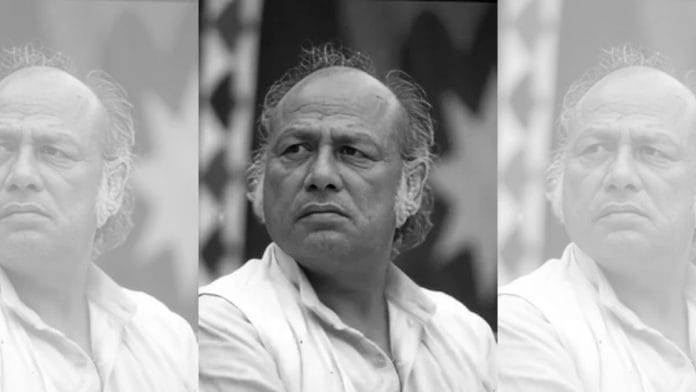New Delhi: It took a poet to stand up to a dictator. In doing so, Habib Jalib became the voice of the Pakistani people. The poet of the masses—‘shayar-e-awaam’.
In 1962, Pakistani President Ayub Khan enacted a constitution through an executive order. It was criticised for being anti-people and giving the President discretionary power. Few dared to raise their voice in that climate of fear and suppression. But that didn’t stop Jalib. He wrote his famous poem Dastoor in protest. With its recurring line— “Mein nahin maanta, mein nahin jaanta” (I refuse to acknowledge. I refuse to accept.)—it became a symbol of defiance in the country.
When Manzur Qadir, the chairman of the constitution committee, heard the poem, he admitted he could not stand up to Jalib’s critique.
Even today, more than 30 years after Jalib’s death, Dastoor remains the poem of protest. In 2019, as anti-CAA agitations raged across New Delhi, the song that had once challenged the authoritarian regime in Pakistan in 1962 resurfaced in India.
Jalib’s poetry didn’t just transcend borders—it transcended time.
“His poetic compositions mythologise the ‘struggle’ for which he and his comrades were being persecuted in Pakistan. He uses the metaphor of “gumbad-e-baydar (a dome with no exit)” as a bird’s-eye perspective of the misery of the moment, and how it is connected with the socio-political question,” musician and economist Shahram Azhar told ThePrint.
Even during the rule of General Zia-ul-Haq, when Pakistan was under martial law, Jalib’s words resonated with the people. By then, the poet and the poem were part of Pakistan’s political and cultural landscape. His literary works, Zikr Behte Khoon Ka and Gumbad-e-Baydar, were banned by the Zia regime, but they were circulated clandestinely, inspiring students, workers, and political activists alike.
Poet for the masses
In 2006, during the peak of General Pervez Musharraf’s regime, Jalib’s poetry found its voice once again in mass protests. Pakistani music band LAAL, known for performing socialist and progressive political songs, would take his songs to the streets. Former band member Shahram Azhar remembers being mocked as “Jalib boys”—an epithet he said they wore with pride.
“Jalib’s Mainay Uss Se Yeh Kaha, which is a satirical poem about the dictator and his advisers, instantly hit a chord with people and became a national anthem. It was sung by workers and peasants, women’s leaders, as well as the leaders of the civil rights and lawyers movement in the country,” said Azhar.
Jalib’s protest came at a hefty price—his freedom. He was in prison for a large part of Zia-ul-Haq’s 11-year regime.
“Jalib’s poetry reflected the aspirations of the oppressed and downtrodden with wit, humour, and sarcasm,” said Taimur Rahman, professor at Lahore University of Management Sciences and the current vocalist and guitarist of LAAL.
Also read: Raj Bisaria saw theatre as a discipline, not a stepping stone to Bollywood
Jalib’s love for Delhi
Habib Jalib’s poetic evolution is tied to the turbulent history of Pakistan. Born on 24 March 1928 in Hoshiarpur, Punjab, in undivided India, he was uprooted during Partition. A heartbroken Jalib wrote an ode to Delhi before leaving:
“O Jalib! I can no longer, in this world, be called a dweller of Delhi.
But, I’ve always, till this day, my home considered you.”
He was born on the day of Eid. He came from extreme poverty. His father used to do tilla work on his shoes in India’s Hoshiarpur. However, the family made sure that the children’s education did not suffer. His father was a poet himself and perhaps his sense of equality came from his early life,” said Tahira Jalib, his daughter living in Lahore.
Settling in Karachi, Jalib found his voice when working as a proofreader for the Urdu paper Imroz whose editor was the poet, Faiz Ahmed Faiz. It was under his influence and that of his peers in the Progressive Writers’ Association that Jalib found his own work lacking.
Under Faiz’s influence, Jalib’s poetry shifted from personal themes of love to social justice and human rights.
Throughout his career, Jalib aligned himself with women’s rights and political freedom. In 1965, he wrote a poem honouring Pakistani actor Neelo, who resisted pressure to perform for the Shah of Iran.
Today, in a Pakistan still struggling with political instability, human rights abuses, and a lack of democratic freedoms, Jalib’s words continue to resonate.
“Jalib would look at Pakistan today and ask: have things changed at all? Well, in most senses they have not: Pakistan still does not have democracy or freedom of speech; the religious and national question remains unresolved; people still lack access to basic rights and freedoms,” Azhar said.
The silver lining is that Jalib’s ideas have penetrated into the hearts and minds of the people of Pakistan. This, said Azhar, is evident in the wave of anti-establishment sentiments in Punjab, traditionally seen as the “dominant” group in Pakistan’s polity. The 2024 elections were proof, Azhar said.
“The elections were a befitting confirmation of Jalib’s political philosophy: without a fundamental democratic and revolutionary change in society, no amount of superficial changes is going to solve the problem,” he said.
The essence of Jalib’s message is power to the people. He wished those who till the land and run the factories to make decisions about their lives themselves.
“It is a blessing to be his daughter. Even if I were the PM of Pakistan, I would not have been so proud. He is a hero for the world,” his daughter said.
(Edited by Ratan Priya)






